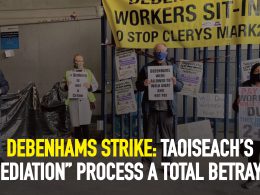“It really beggars belief that trade union leaders would have the brazenness to propose to low and middle income public sector workers that they should agree, not just an acceptance of the savage wage cuts already meted out, but ‘revolutionary’ measures that can have a further devastating effect on the incomes and working conditions of those workers.
“This is a shameless sell out. It demonstrates utter contempt for rank and file trade union members. It portrays a trade union leadership in utter thrall to the discredited neoliberal economic agenda and utterly incapable of offering any alternative to the resultant onslaught on workers’ jobs and living standards in both the public and private sectors.
“The fact that the union leaders agree this on the same day as the Government announce the pouring of up to €22 billion in taxpayers’ funds to rescue big bankers, speculators and bondholders, shows that they live in a parallel universe totally divorced from the lives and feelings of the unions’ ordinary members. What in effect thy have agreed to is that low and middle income public sector workers must be crucified in order to feed the sharks in the financial markets.
“Meanwhile the super rich in society remain unscathed such as the 300 individuals who own €50 billion in assets according to the Sunday Independent ‘Rich List’ . But already hard pressed workers on €30,000 a year are expected to soak up more punishment.
“Public sector workers should reject these proposals out of hand. Sustained public sector wide industrial action should be employed to reverse the cuts and force a change in policy.
“And workers in both the public and private sectors should link up to overthrow the policy of bail out for the big bankers and speculators. The alternative is nationalisation that is directly under the democratic control and management of working people so that major investment in public infrastructure can create tens of thousands of jobs, provide cheap credit for individuals and small business and ameliorate working people caught in the nightmare of negative equity.”









